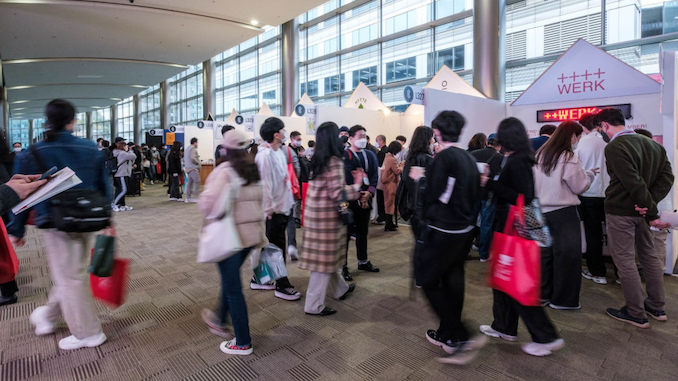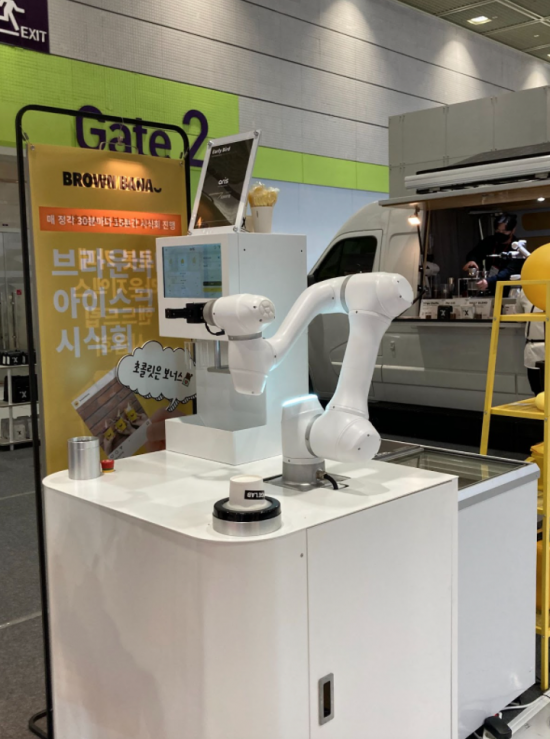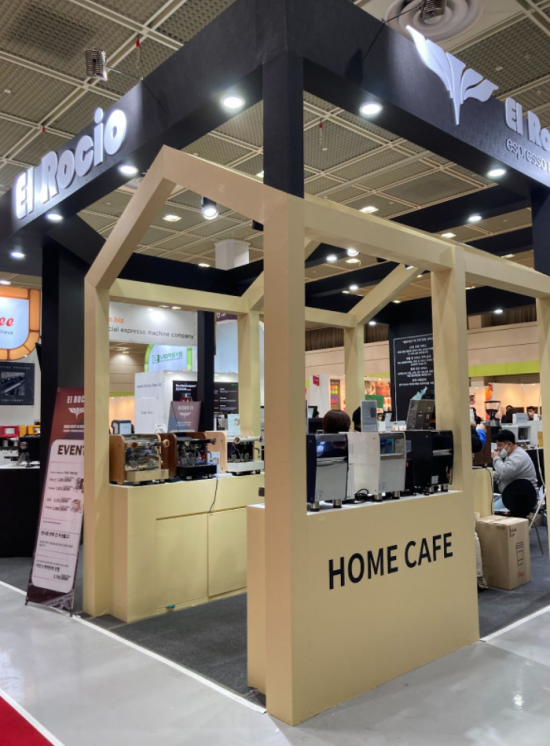
Although Cafe Show Seoul ran in 2020, this year’s edition welcomed noticeably more international attendees.
BY SUNGHEE TARK
SPECIAL TO BARISTA MAGAZINE ONLINE
Cover photo by Wonjin Cho
From November 10 to 13, Seoul welcomed over 110,000 attendees to its 20th annual Cafe Show Seoul. After a slower year in 2020, the 2021 edition felt more lively. It seemed to reflect the country’s “With-Corona” policies that eased on gatherings of larger groups, which began in November.
Cafe Show Seoul prides itself on being Asia’s biggest coffee trade show, with an annual average of 150,000 attendees. Due to the country’s COVID restrictions this year, however, the show was mostly attended by domestic professionals; yet, more international attendees and booths were showcasing their companies and brands this year compared to 2020. Cafe Show reports that there were over 3,121 brands and 625 companies from 30 countries present at the show over four days.
Cera Jung from SCA Korea shared that the event was more lively than in 2020. “It is noteworthy to see that compared to last year, a lot more booths have participated and invested in making their booths stand out with interactive activities. It feels as though we had (almost) come back stronger after what was a very hard and uncertain year, but of course, with masks on our face.”
As I walked around the floor, I was able to notice a few changes to this year’s participating booths compared to last year. They included:
Automation
There have been more conversations around automation in cafés recently. Cafe Show Seoul was no exception to showcase the recent developments in the field. Right at the main entrance of the exhibit hall were various organizations featuring their latest development in automation, with robots that brewed and served coffee based on orders that have been made with QR codes at the seat. With the rising number of coffee shops operating people-less (and contact-less) in Korea, these booths attracted a crowd of curious and keen business owners.

Home Cafés
Lately, drinking coffee at home has increased in Korea. Traditionally a tea-drinking country, Korean consumption of coffee has been always tied to the space that cafés provide. This has been manifested through two broad trends in Korea: (1) A lot of importance is given to café spaces and their aesthetics; and (2) a relatively lower percentage of people brew coffee at home (but rather consume RTDs or instant solubles). However, especially with the limitation on café operations during COVID, the number of people interested in brewing at home (and creating what they call the home-café) has increased.
On the floor, this trend was exhibited through the premiumization of coffee pods, with a growing number of single-serve coffee maker owners. Many specialty-coffee companies have also expanded to offer coffee pods for sale, along with cold brew RTDs. Compared to previous years, there was a visibly larger number of companies selling premium coffee pods on the floor. And further, espresso companies specifically targeted home baristas with smaller machines for homes.

Increased Environmental Awareness
The Korean government banned the use of paper cups in cafés in 2018, limiting their use only for takeout. While the policy has been loosely implemented during COVID-19, this policy has coincided with increased interest in the public and cafés to take a more environmentally friendly approach to coffee consumption.
As a result of this increased interest, booths that exhibited eco-friendly packaging solutions as their primary product seem to have increased, while Cafe Show Seoul itself has actively replaced its previously plastic-based entrance tickets, packages, and cups with recyclable paper products.
Other Trends and More
On the floor were also competitions such as Latte Art Battles, Masters of Cupping, and Masters of Brewing. Another popular area was the Coffee Alley, which featured over 30 micro-roasters from different parts of South Korea, including Pont Coffee, Imi Coffee, Werk Roasters, and Lazymoment Coffee Stand.
One noticeable trend with the micro-roasters was their offering of “rare” lots. Most of the stands had coffees with non-traditional processes with names such as “cinnamon-infused processing” and other sophisticated fermentation processes. Flavor profiles of cola, eucalyptus, and even Powerade were frequently seen across several booths.
As processing on farms has been diversified and availability has increased, it has also reduced the hurdles for micro-roasters to afford them more easily. ”It’s a recent trend that I see but I don’t think it’s a fleeting one,” said Daewoong Song of Felt Coffee Seoul.

World Coffee Leaders Forum
During the same time at the Cafe Show, the World Coffee Leaders Forum (WCLF) ran for the 10th year. The focus of WCLF was Refocus, Revive, Reboot—turning risks into opportunities: coffee industry in Post-Covid Era. Speakers joined the audience mostly in-person to share their insights on the coffee industry moving forward.
While there were several points made in the conversations held during the three-day conference, the focal point was to understand where we are going as an industry. Bartosz Ciepaj of Harrods spoke about the tendency for a segment of consumers to move toward “ultra-specialty.” Ralf Rueller of The Barn Coffee Roasters called for more involvement from roasters and consuming countries to make an impact at origin for the sustainable coffee industry.
Data scientist and thought leader in Korea Gil-young Song also shed light on the history of the Korean coffee industry from a data-driven point of view to predict where it is headed: to a more Instagrammable and shareable experience of one’s space as a primary driver of café growth.
Further, WCLF annually hosts professional sessions for people who want to deepen their skills on key topics. This year was no different. From talks on processing to brewing and sensory, attendees had a plethora of workshops to choose to attend. It was also the first year that SCA launched its Coffee Technician Program in Korea.
While the Korean society as a whole strives to find the right balance with its With-Corona policy for public gatherings, Cafe Show Seoul seems to show a glimpse of what it may hopefully be like moving forward.
ABOUT THE AUTHOR
Sunghee Tark (she/her) is the co-founder of Bean Voyage, a feminist organization that collaborates with smallholder womxn coffee producers to build an equitable coffee value chain. She is also a freelance coffee writer, Specialty Coffee Association LEAD Scholar, and Re:Co Fellow.

